|
|
|
|
|
|
10-08-2018
|
Just checking out/adjusting
some links on the page.
As time goes by various web sites changes resulting in dead links.
Danish Met. Inst. f.e. removes articles.
Naturally this is not done in any political fashion.
Its pure coincidence that a critical article regarding the “hockeystick” from 2004 got lost.
Thankfully it could be resurrected via “way back machine” so now its
online on this website again 😊
link dmi 001
|
|
|
|
03-01-2016
|
Havde
Al Gore ret i 2006 ?
|
|
16-03-2013
|
Australiens
temperatur målt fra sattelit (UAH) siden 1979: 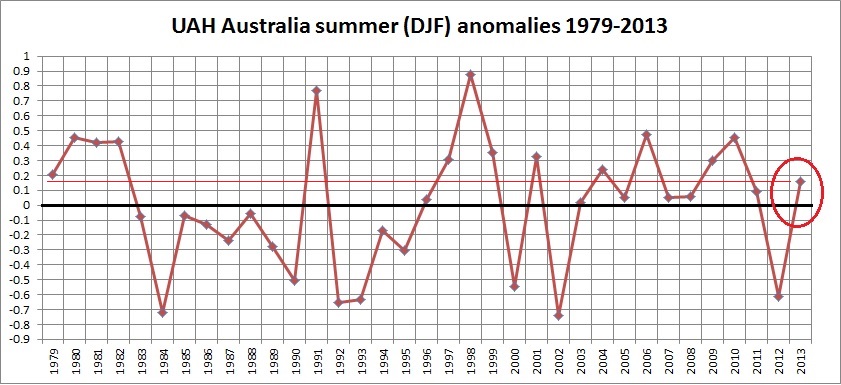
|
|
23-11-2011
|
5.000+ nye emails fra UEA/CRU
Climategate 2.0 - Climateaudit
Climategate 2.0 - Watts
|
|
15-11-2011
|
Russian Scientist Predicts The Next Grand Minimum 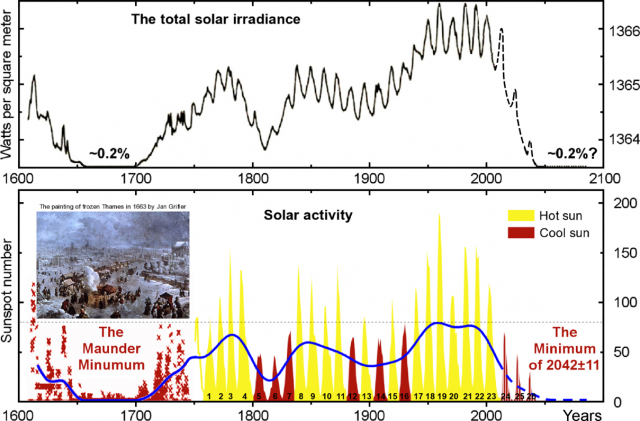
|
|
18-07-2011
|
Rural
Unadjusted Temperature Index - Historiske temperaturer i Skandivanien  
|
|
31-10-2010
|
New peer reviewed paper says
“there appear to have been periods of ice free summers in the central
Arctic Ocean” in the early Holocene, about 10-11,000 years ago 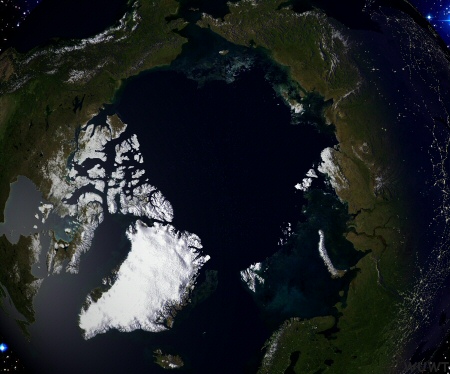
"The combined sea ice data suggest that the seasonal Arctic sea
ice cover was strongly reduced during most of the early Holocene and
there appear to have been periods of ice free summers in the central
Arctic Ocean. This has important consequences for our understanding of
the recent trend of declining sea ice, and calls for further research
on causal links between Arctic climate and sea ice."
|
|
16-09-2010
|
Scientist: There is no
observational evidence for influence of CO2 on present or past climate
"Dr. Ir. Noor van Andel, former head of
research at Akzo Nobel, recently presented a talk at the Dutch
Meteorological Institute KNMI, concluding there is • No observational
evidence for influence of CO2 on past or present climate"
|
|
16-09-2010
|
Understanding the
Climategate Inquiries By Ross McKitrick, Ph.D
"The scientists took steps individually or in collusion to block
access to data or methodologies in order to prevent external
examination of their work. This point was accepted by the Commons
Inquiry and Muir Russell, and the authors were admonished and
encouraged to improve their conduct in the future."
|
|
04-09-2010
|
Unadjusted
temperature series
link 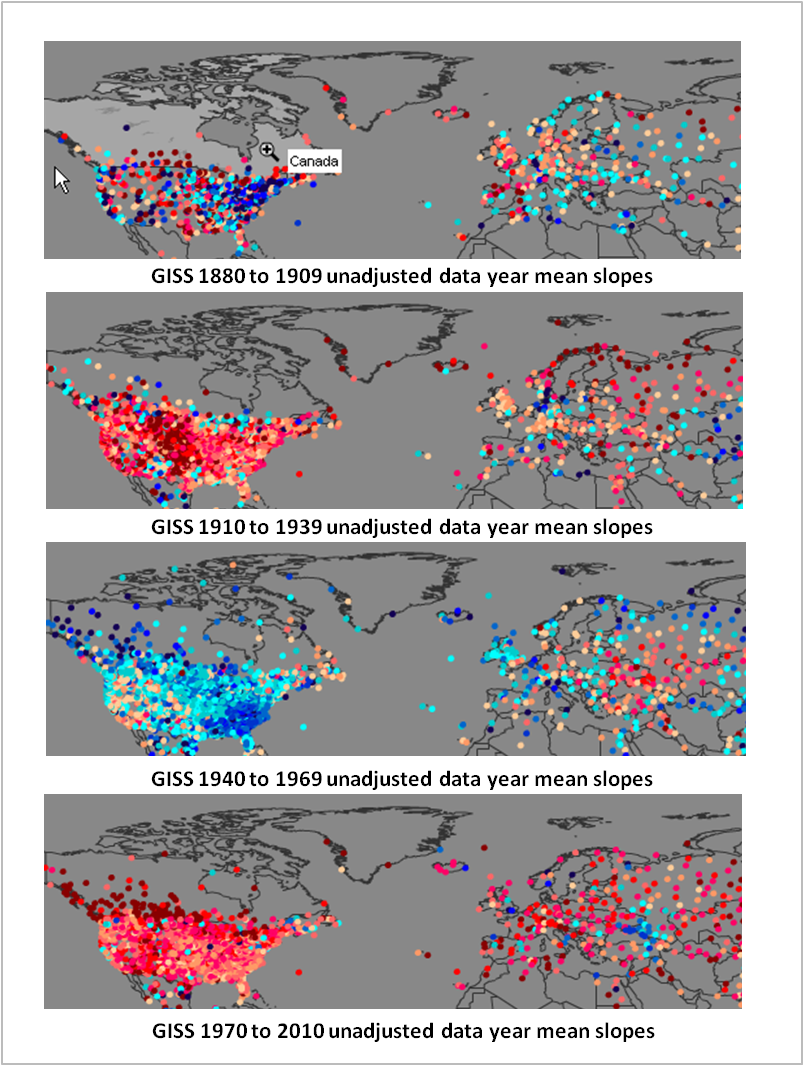
" Although the original data was chosen for its cooling trend
this, in many cases, results from warmer temperatures in the period
1930-1940 than present. The wave pattern is still present in many data
sets worldwide, no matter what the overall trend. In some the date of
the onset of warming or cooling is later or earlier, depending on
location – as would be expected with the oceans moving warmth around
the globe. In others however the wave pattern is not present or is
obliterated by something – in these sets should it be present or not?
Is it wiped out by anthropogenic effects on the temperature record such
as growth of cities and even small rural communities though the
otherwise cooling 40s, 50s and 60s? "
|
|
15-08-2010
|
Sea
levels in South Pacific
link 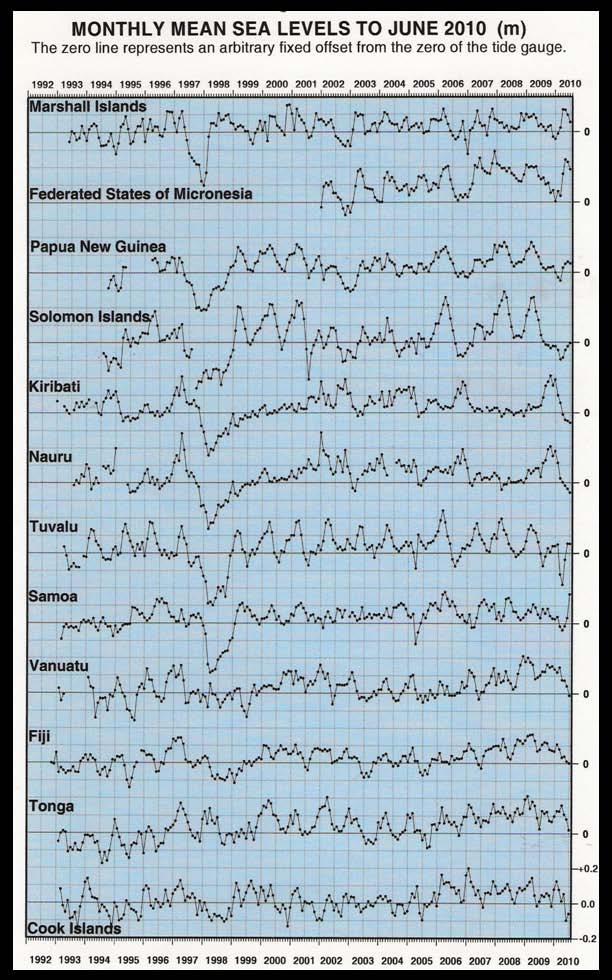
" By looking closely at the records, it turns out that the much
advertised rising sea levels in the South Pacific depend on anomalous
depressions of the ocean during 1997 and 1998 thanks to an El Nino and
two tropical cyclones. The Science and Public Policy Institute has
released a report by Vincent Gray which compares 12 Pacific Island
records and shows that in many cases it’s these anomalies that set the
trends… and if the anomaly is removed, sea levels appear to be more or
less constant since the Seaframe measurements
began around 1993. "
|
|
15-08-2010
|
Christy
bedømmer klima modeller anno 1988
link 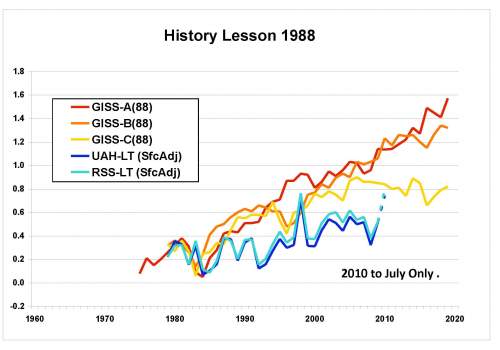
" The result suggests the old NASA GCM was considerably more
sensitive to GHGs than is the real atmosphere since (a) the model was
forced with lower GHG concentrations than actually occurred and (b)
still gave a result that was significantly warmer than observations. "
|
|
23-07-2010
|
Ny gennemgang af GISS og
deres ændrede vægtning af land- og sea-målinger
Ser ud til at vægtningen er ændret i løbet af 1900-tallet, således at
den overstiger den naturlige 30/70 fordeling.
link
" Whats the impact of the still greater
land fraction in GISS global total LST+SST data?
If the 30% land fraction from the real world was used, GISS global 2007
would be 0,55K warmer than GISS global 1900.
With the still increasing GISS land fraction actually used, we have
GISS global 2007 0,72K warmer than GISS global 1900.
The difference is 0,17K added by increasing land fraction over the
20´ieth century in stead of using 30% land
constantly.
But this calculation could be done in many ways. We know for a fact that
the oceans cover 70% of the planet. So why
not use 70% of data from SST? "
|
|
26-05-2010
|
Steve McIntyre
indlæg fra Chicago klima konference der gennemgår historien om
ClimateGate email sagen fra 1997 og frem.
PDF Video
"The critical scientific issue – as it has been for the past 30
years – is climate sensitivity and whether cloud and water cycle feedbacks
are strongly positive or weakly negative or somewhere in between.
This is territory of Lindzen, Spencer, Kininmonth and Paltridge.
But persuasive as they may be, keep an open mind because many serious
scientists do not agree with them and stand behind standard estimates
of climate sensitivity to doubled CO2 in good faith.
If the impact of doubled CO2 is relatively small, it would be through
sheer good luck rather than through good management. I do not subscribe
to the belief that we need perfect certainty to make decisions – on the
contrary, businessmen and politicians make decisions all the time under
unquantifiable uncertainty and I, for one, have no philosophical
objection to governments making decisions on climate policy. I think
that there may be important practical situations where people who are
primarily worried about the energy future can find common ground with
people who are primarily worried about climate.
If I were a minister of the environment with policy responsibilities,
regardless of what I felt personally, I would take scientific guidance
from official institutions, rather than what I might think personally
either as an occasional contributor to academic journals or as a
blogger. Though,
knowing what I know now, I would also try to improve the performance
and accountability of
these institutions.
People sometimes say to me – if the hockey stick is wrong, then the
situation is worse than we think – arguing this on the basis that this
would be evidence of greater climate sensitivity. My standard answer is
– well, if that’s the case, we should find out and govern ourselves
accordingly.
And give no thanks to people whose obstruction has delayed the
resolution of the problem.
Og glem ikke John
Stewart (Daily Show) video
om Climategate :-)
|
|
18-05-2010
|
Der er klima konference med
bla. Patrick Michaels

Klik her for Lindzen
præsenattion: pdf
|
|
23-03-2010
|
GISS data er åbenbart blevet
efter justeret med tilbagevirkende kraft:
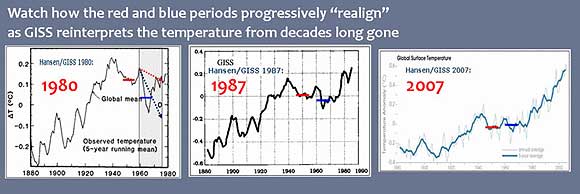
Læs mere:
HideTheDecline
Icecap
JoNova
|
|
14-03-2010
|
Chris Horner med video
kommentar til NASA temperatur dataset mm.
|
|
11-03-2010
|
Link
til skeptiker
håndbog. Dansk oversættelse af artikel fra Jo
Nova website . link mm
(Jo Nova som i bogen skriver at hun troede på AGW 1990-2007
!! )
|
|
07-03-2010
|
Ugens graf, klimaet de
sidste 10.000 år iflg. iskerner (Grønland): artikel
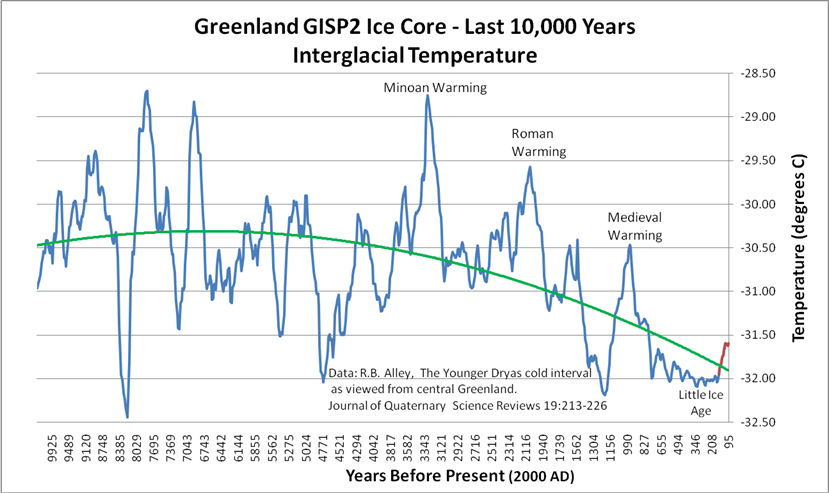
|
|
23-02-2010
|
Michael
Crichton's tale om Videnskabens udvikling de sidste 30 år
|
|
15-02-2010
|
Scandinavian temperatures,
IPCC´s "Scandinavia-gate"
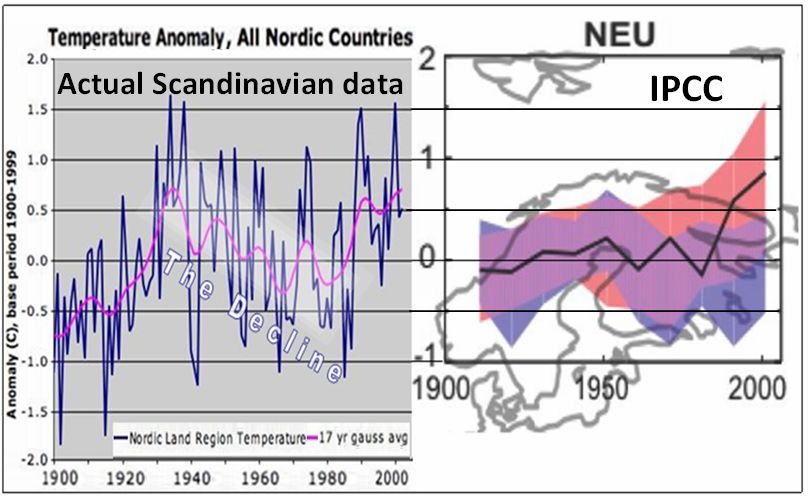
|
|
15-02-2010
|
Ny side inspireret af CRU
Climate-Gate, HideTheDecline
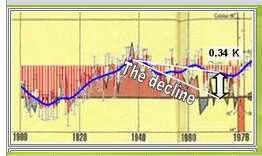
|
|
24-01-2010
|
Bill Gates med en note
omkring hvad 80% CO2 reduktion virkelig betyder: Gates
|
|
24-01-2010
|
IPCC og deres fejl mht.
gletchere i Himalaya telegraph
"More mistakes about Himalayan glaciers
seem to have been uncovered in the Intergovernmental Panel on Climate
Change’s (IPCC) latest report, further threatening its credibility and
undermining the position of its chairman, Dr Rajendra Pachauri."
|
|
13-01-2010
|
Spencer: Clouds Dominate CO2
as a Climate Driver Since 2000
"Any way you look at it, the evidence for internally-forced
climate change is pretty clear. Based upon this satellite evidence
alone, I do not see how the IPCC can continue to ignore
internally-forced variations in the climate system. The evidence for
its existence is there for all to see, and in my opinion, the IPCC’s
lack of diagnostic skill in this matter verges on scientific
malpractice."
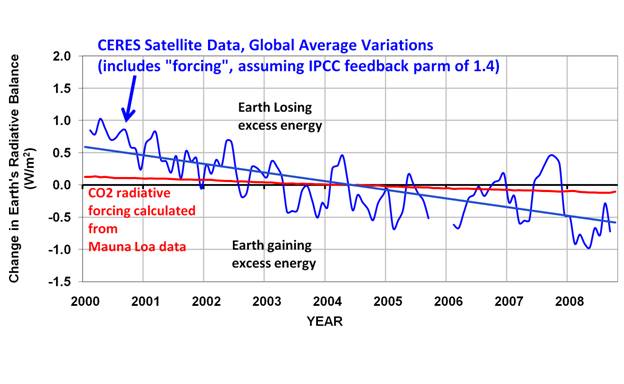
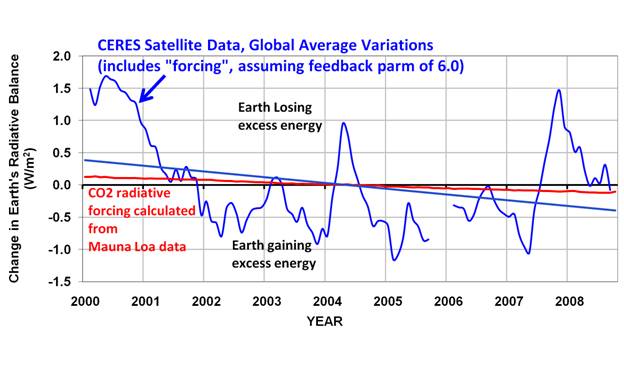
|
|
03-01-2010
|
Landscheidt info :
Landscheidt Cycles Research
"Back in 1965 Paul Jose was one of the
first to link solar modulation with planetary movements. He discovered
that the planets roughly returned to the same position every 178.8
years (My research suggests 172 yrs). Jose's
paper included a very rough solar radius graph which showed some
modulation but was difficult to draw from. Later Theodor Landscheidt wrote many papers using a similar
principle but mainly relied on solar torque graphs which ranged over
long time periods, this made it difficult to predict a solar grand
minimum except in a rough time frame. Landscheidt
predicted a Grand Minimum to occur around 2030 which might be late, if
the current trend continues.
Then Carl Smith in 2007 using JPL data and his own programming skills
plotted the Angular Momentum of the Sun. This graph I believe is the
Rosetta stone of solar science."
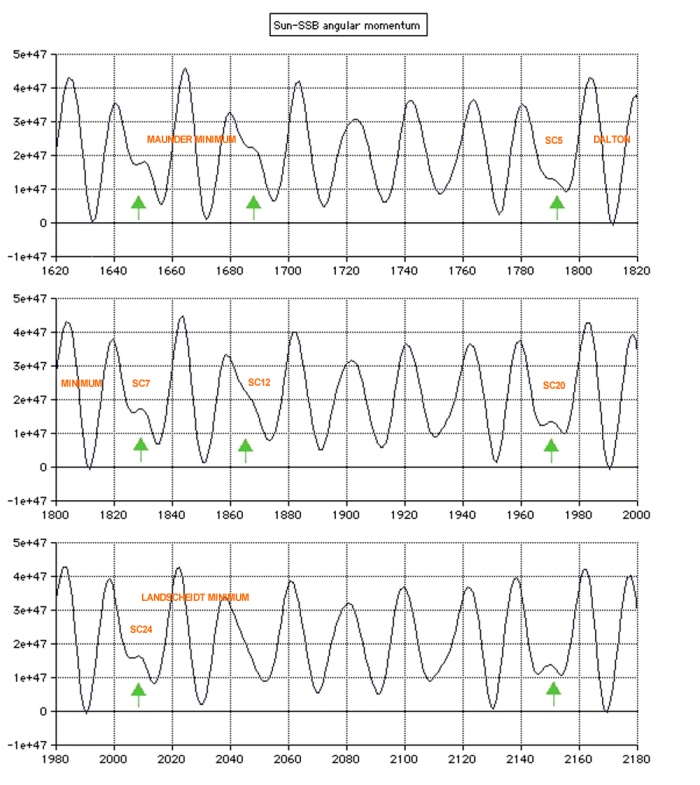
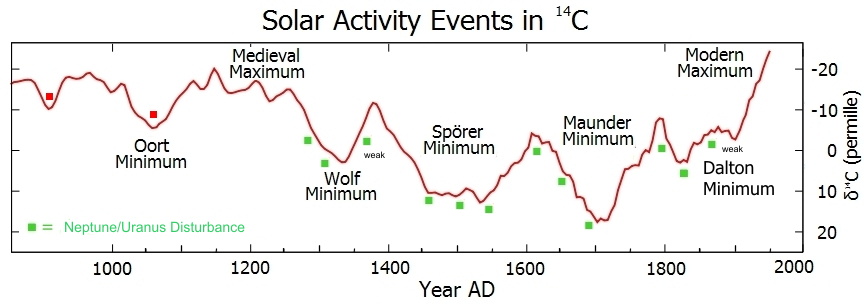
Earth's Future Climate.
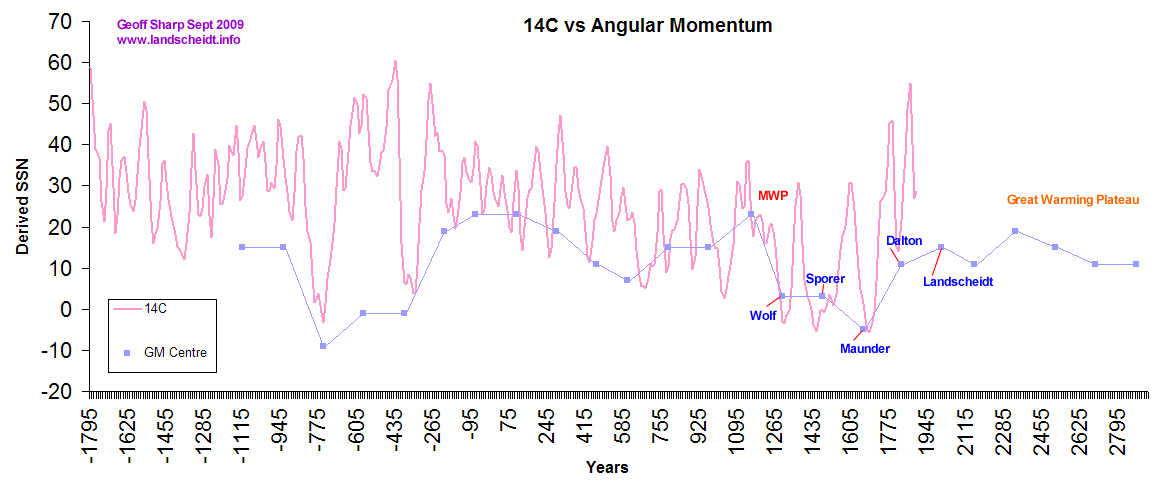
|
|
28-12-2009
|
The Unbearable Complexity of Climate
(Willis Eschenbach)

|